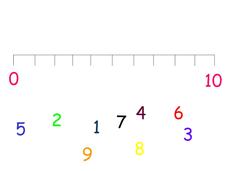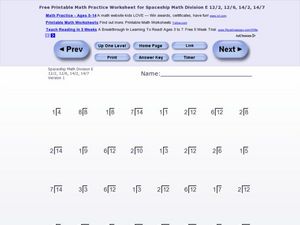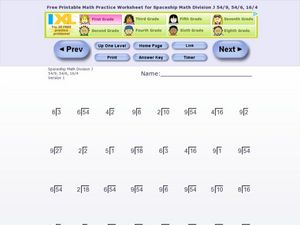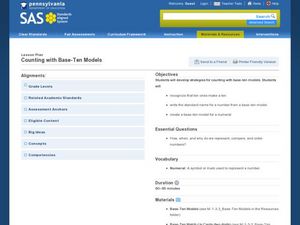Curated OER
What is One Less?
In this counting and subtracting one learning exercise, students count each group of objects, count back one, and write the totals. Students solve 9 problems.
Curated OER
Understanding 10: Backwards and Forwards
Help your young mathematicians completely master 10 by practicing one-to-one correspondence, number recognition, and recording numbers displayed. They make 10 with groups of two-different colored cubes and color in 10-frames to show how...
Curated OER
Comparing Numbers Up to 10 Guided Lesson
Kindergartners demonstrate their ability to identify which numbers are the largest, the smallest, and equal to other numbers using this one-page worksheet. They must also count the total numbers in a series.
Curated OER
Mentally Add and Subtract 10 or 100
Don't let the title of this one fool you; scholars skip count only by 10 in this number sequence worksheet. They fill in missing numbers on a number line to complete each sequence, adding or subtracting 10. There are two addition...
Curated OER
Mentally Add and Subtract 10 or 100
Find the missing digits in these number sequences. Each of the ten has one missing number and scholars must figure out what it is. Here's the pattern: all of these sequences involve counting by 10s. Learners add or subtract 10 to...
Curated OER
What's That Number? 1-Digit Addition and Subtraction
In this subtraction and addition worksheet, young scholars fill in missing numbers in problems necessary to arrive at given answers. All problems use 1-digit numbers only.
Curated OER
One Fish, Two Fish, Red Fish, Blue Fish
Review addition and color recognition skills using this resource. After reading the Dr. Seuss story One Fish Two Fish Red Fish Blue Fish, learners practice one digit addition by completing six problems. They color the fish on the sheet...
Curated OER
Twenty-One Domain and Range Problems
For this domain and range worksheet, students identify the domain and/or range for twenty-one free-response and multiple choice problems. The functions include trigonometric functions. The solutions are provided.
Curated OER
The Number Line
A simple idea is presented in this mathematics PowerPoint. Young learners see two number lines; 1 - 10, and 11 - 20. All of the numbers that belong on the number line are randomly scattered in the slides. Learners must place the digits...
Curated OER
Multiplication: One and Two Digit Numbers
In this multiplication worksheet, students multiply one digit numbers by two digit numbers and three digit numbers. Students complete 28 problems.
Curated OER
One Digit Addition and Subtraction (R)
For this addition and subtraction worksheet, students improve their math skills by solving the one digit addition and subtraction problems. Students solve 49 problems.
Curated OER
Addition: one and two digit numbers
For this addition worksheet, 2nd graders add one and two digit numbers together with the help of a number line. Students complete 19 problems.
Curated OER
One-Digit Addition and Subtraction (B)
For this addition and subtraction worksheet, learners find the sums and differences of one-digit numbers. Students solve 49 problems.
Curated OER
Divide By One-Digit Numbers
In this finding the quotients learning exercise, students divide one-digit and two-digit numbers by one-digit numbers with no remainders. Students solve 40 problems.
Curated OER
Divide Two-Digits by One-Digit 1
In this finding the quotients worksheet, 3rd graders divide two-digit numbers by one-digit numbers with no remainders. Students solve 40 problems.
Curated OER
Subtracting With Number Lines
In this subtraction worksheet, students subtract one digit numbers using number lines. Students complete 10 subtraction problems.
Curated OER
Multiplying by Multiples of Positive Powers of Ten (C)
For this powers of ten worksheet, students multiply single-digit whole numbers by positive powers of ten. This two-page worksheet contains approximately 50 problems, with answers.
Curated OER
Counting with Base - Ten Models
Help your kids develop strategies for counting. In this base-ten lesson, learners use matching cards, base 10 blocks, and dry erase markers and boards to examine the base 10 counting system.
Curated OER
Multiplying by Multiples of Negative Powers of Ten (B)
In this powers of ten worksheet, learners multiply single-digit numbers by negative powers of ten. This two-page worksheet contains approximately 50 problems, with answers.
Curated OER
Multiplying by Multiples of Positive Powers of Ten (B)
In this powers of ten worksheet, students multiply single-digit whole numbers by multiples of powers of ten. This two-page worksheet contains approximately 50 problems, with answers.
Curated OER
Multiplying by Multiples of Negative Powers of Ten (E)
In this powers of ten activity, students multiply single-digit numbers by multiples of negative powers of ten. This two-page activity contains approximately 50 problems, with answers.
Curated OER
Dividing by Multiples of Positive Powers of Ten (C): Single-Digit
Students can practice their positive powers of ten in this instructional activity, in which they are given 10 numbers to divide by a set of multiples in the format x, x0, x00, x000, x0,000. A challenge question is available to further...
DK Publishing
Multiplying and Dividing by 10 and 100
Challenge your third and fourth graders with a math worksheet about the multiples of 10 and 100! Youngsters solve four sections of problems, all involving multiplying and dividing by 10 and 100. Great practice before getting into larger...
Curated OER
Number Bonds to 10: Determine the missing addend
Each slide contains a group of animals and an equation that adds up to 10. However each equation is missing a number, learners attempt to determine the missing addend to revile the number of animals hiding under the cloud. A fun,...
Other popular searches
- Number Words 1 100
- Prime Number 1 100
- Hundred Charts 1 1000
- Ordering Numbers 1 100
- Counting One to Ten
- One Is a Snail Ten Is a Crab
- Ordinal Number 1 10
- Hundred Charts 1 1000 Charts
- Number 1 10 Recognize
- Numbers 1 Through Ten
- One More Ten More
- Adding Ten and Using One Less























